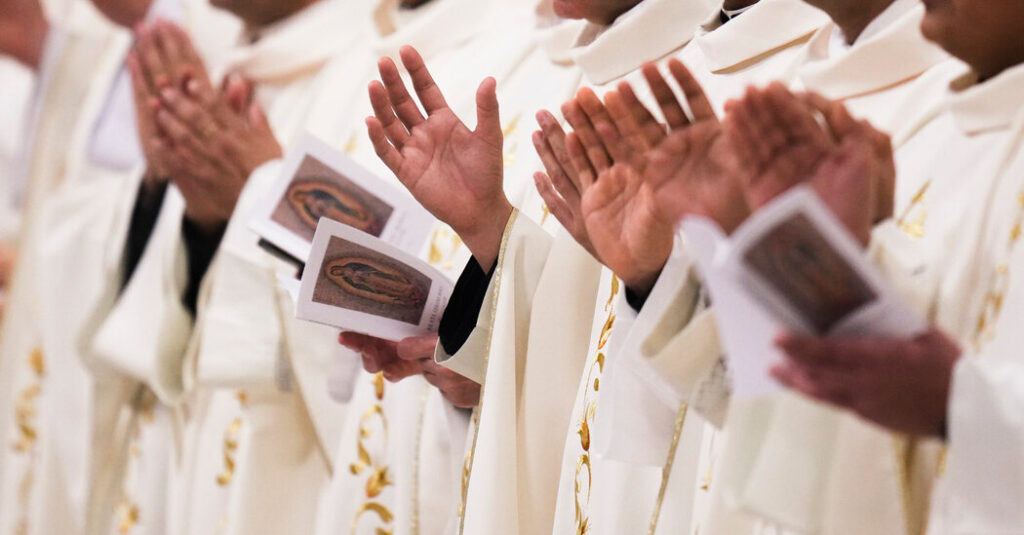approved by the Vatican Italy’s new guidelines They argue that as long as a person remains celibate, he cannot be denied admission to seminary simply because he is homosexual.
The guidelines say seminary directors should consider sexual orientation to be just one aspect of a candidate’s personality.
They do not change the Roman Catholic Church’s teaching that “homosexual tendencies” are “intrinsically disordered” and that men with “deep-seated” homosexual tendencies should not become priests. . However, they make clear that sexual orientation should not disqualify candidates from the priesthood, provided they remain chaste.
The Catholic Church has long struggled with the contradiction that its clergy has been a haven for gay men, while its teachings deny same-sex relationships.
Bishops in other countries where homosexuality is routinely condemned are unlikely to consider guidelines like those in Italy.
The guidelines, adopted by the Italian bishops’ conference in November and approved by the Vatican’s Office for the Clergy, entered into force on Thursday for a three-year trial period. These cover various aspects of the candidates’ days spent in the seminary, a school that prepares them for the priesthood.
“This is the first time I’ve seen any suggestion in a Vatican-approved document that sexual orientation alone cannot determine whether homosexuals can enter seminaries,” said the prominent Reverend James Martin. A proponent of making the church more welcoming to gay Catholics.
Father Martin, who is based in New York, added: “My interpretation of this is just my interpretation.” “This means that if a gay man is mentally healthy and able to live a chaste, celibate life, he may be considered for admission” to the seminary. ”
The complication of this issue was exacerbated last year by reports that Pope Francis used an anti-gay slur when responding to Italian bishops about allowing gay men to enter seminaries at a conference in May. , it became clear.
In his remarks, Francis said there were already too many homosexuals in Catholic seminaries and used derogatory language, according to bishops who attended the meeting. The Vatican later apologized.
In June, the Pope was again accused of repeating anti-gay slurs during a meeting with priests.
The repeated use of the slur shocked many Catholics who had embraced Francis’ near-inclusive message urging the church to be more welcoming to members of the LGBTQ community. He has frequently met with gay rights activists and has decided in 2023 to allow priests to bless same-sex couples, but not their unions.
Father Martin, who met with Francis after the incident last year, later said: Post on social media “The Pope, with permission to share this, said that he knows many good and holy celibate seminarians and priests who have homosexual tendencies.”
But Francis has repeatedly expressed concern that gay clergy candidates could end up having relationships and leading what he called double lives.
In 2016, he gave the go-ahead to a document on priestly vocations that said men with “deep-seated” homosexual tendencies should not be admitted to seminaries, a 2005 document approved by Pope Benedict XVI. was reproduced.
Seminary directors have interpreted these instructions in a variety of ways, and the new guidelines provide some clarity.
The guidelines, posted on the Italian Bishops’ Conference website on Thursday, cite the 2016 document’s ban on men with deep-seated homosexual tendencies, but also say: Although we narrow our insight to just this aspect, we need to understand its meaning in the overall picture of the young person’s personality, just like any other candidate. ”
The guidelines also state that “the goal of the formation of clergy candidates in the emotional and sexual realm is the ability to be welcomed as a gift, to freely choose, and to live responsibly in celibacy and chastity.” There is. The section of the guidelines regarding the importance of celibacy does not differ based on sexual orientation.
“This is a step forward,” said Frances DeBernardo, executive director of New Ways Ministries, a Maryland-based organization that supports gay Catholics.
“This clarifies previously vague statements about gay seminary candidates that have caused much fear and discrimination. We treat them the same way we treat candidates. This kind of equal treatment is what the church should strive for when it comes to all LGBTQ+ issues.”
